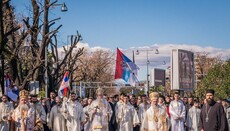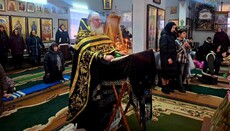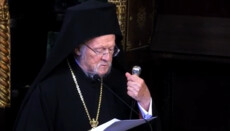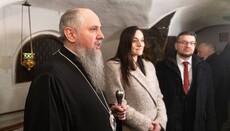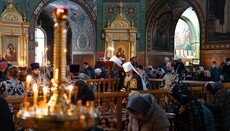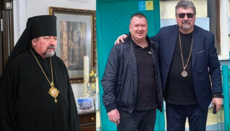Roman Consultation of Theologians issues a resolution on persecution of UOC
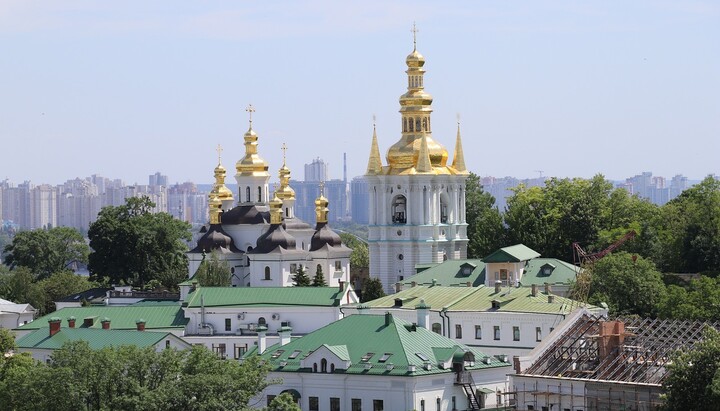
During the Berlin and Rome consultations, the bold patriotic position of the UOC represented by its Primate and leadership was noted.
Theological consultations were held in Berlin on 2 February 2024 and in Rome on 27 April, at which theologians, historians, sociologists, lawyers and experts in the field of ecumenical relations analyzed the observance of norms on religious freedom in Ukraine on the example of pressure on the Ukrainian Orthodox Church by local and national authorities. This work resulted in a declaration, which was published by Baznica.info.
The UOJ publishes the full text of the declaration:
We support Ukraine in its just defensive war and believe that lawful and justified actions of special services and state bodies to protect the constitutional order and prevent collaborationism and espionage against specific perpetrators are within the legal framework. At the same time, we cannot share the rhetoric that exploits the thesis of collective responsibility of the entire religious community for the actions of its individual members or clerics.
We advocate that even in the conditions of war with the authoritarian Russian regime, Ukraine should remain committed to democratic values, which include freedom of religion as one of the basic values.
The declaration in the form of a "Decree" by the World Russian People's Council, an organization almost entirely dependent on the Russian Orthodox Church and headed by its patriarch, of 27 March 2024 on the nature of the Russian-Ukrainian war as "sacred" causes justified protest on the part of European and Ukrainian Orthodox and is an attempt to instrumentalize religious rhetoric to justify the Kremlin's aggressive foreign policy and the claims of Russian nationalists to the lands of the neighbouring state.
Statements and actions by the Russian Orthodox Church, including the seizure of administrative control over dioceses of the Ukrainian Orthodox Church in the occupied territories, lead to growing concern on the part of the Ukrainian state. This has further stalled the already tense and complex situation between the Ukrainian Orthodox Church and the Ukrainian state authorities.
In recent months, there has been an escalation of pressure from state authorities and special services in Ukraine, both at the local and national levels, against the clergy and parishioners of the Ukrainian Orthodox Church. Examples of such pressure in recent months include the attack on Bishop Longin (Zhar), criminal cases against Metropolitan Theodosiy of Cherkasy, Metropolitan Arseniy of Sviatohirsk, Archpriest Mykolay Danylevich and others. The high ecclesiastical status of the defendants in the criminal cases indicates an increase in the level of pressure on the Church.
In a number of cases, we can confidently state the repressive nature of criminal cases initiated with the use of dubious evidence. In our opinion, their purpose is to obstruct the legitimate human rights public activities of bishops and clerics of the UOC, and this can be described as a violation of freedom of religion and interference of special services in the activities of a religious organisation.
A separate alarming signal is the continuing seizures of churches, as reported by participants in the consultations who reside in Ukraine and carry out internal monitoring of the processes taking place. They are carried out with the connivance of local authorities, using imperfect legislation and often with the use of force.
Orthodox journalists who cover the situation in church-state relations and try to do their job by publishing facts and assessing abuses by the authorities are subjected to various forms of persecution, including criminal prosecution. During the consultation, the silence of the journalistic professional community, which does not respond to cases of persecution of colleagues, was repeatedly noted.
A systematic campaign of defaming the Ukrainian Orthodox Church, which is presented as "pro-Moscow" or "disloyal", is being carried out within the framework of the "United News Telethon", as well as in Ukrainian Internet publications, or a few cases of collaborationism are directly inflated and generalised to the entire many-million church community. Such campaigns to denigrate the country's largest religious organisation are of acute concern as they provoke a division of society and give Kremlin propaganda an excuse to question the democratic nature of Ukrainian statehood.
Attempts by the state and judicial authorities to present one of the country's Orthodox communities as a symbol of sovereignty are of particular concern. This is also reflected in the absurd judicial formulations about "the Orthodox Church of Ukraine as one of the symbols of sovereignty", which contradict the Constitution.
During the Berlin and Rome consultations, the courageous patriotic position of the Ukrainian Orthodox Church represented by its Primate and leadership was noted. The Primate of the Church, Metropolitan Onuphry, condemned Russia's actions in the first hours after the full-scale invasion began. The Ukrainian Orthodox Church also condemned the "Decree" of the World Russian People's Council, which recognised the war as "sacred".
Priests and laymen of the Ukrainian Orthodox Church are actively volunteering to support the Ukrainian Armed Forces and refugees. In military units, a significant proportion of servicemen are parishioners of the Ukrainian Orthodox Church. Among them are many close relatives of UOC priests. Some priests and monks of the UOC are servicemen or volunteers at the front or in the frontline zone. At the same time, however, UOC priests are prohibited by law from participating in chaplaincy ministry and providing spiritual care to the Orthodox defenders of Ukraine, who are thus discriminated against on religious grounds.
To sum up, we appeal to European politicians, non-governmental organisations, religious unions and the ecumenical community to pay attention to the numerous violations of the rights and freedoms of believers of the Ukrainian Orthodox Church and to establish a permanent monitoring body under the auspices of the EU in the field of religious freedom in Ukraine.
In turn, the working group of the Rome Consultation will continue its activities on monitoring and reporting the situation around the Ukrainian Orthodox Church.
St. Meinard’s Foundation and participants in the Rome Consultation
As reported by the UOJ, a theological consultation on the situation around the Ukrainian Orthodox Church was held in Rome.
